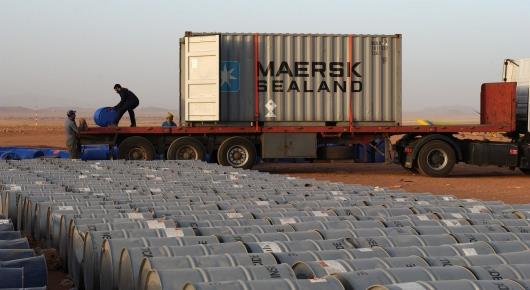FAO welcomes Turkey’s ratification of agreement on hazardous chemical trade

The Food and Agriculture Organization of the United Nations (FAO) welcomed Turkey’s recent ratification of the Rotterdam Convention – an international treaty aimed at protecting people and the environment from pesticide poisoning and other potential harm from trade in hazardous chemicals.
The law on ratification was signed by Turkish President Recep Tayyip Erdogan and published last week in the government’s Official Gazette.
The Rotterdam Convention on the Prior Informed Consent Procedure for Certain Hazardous Chemicals and Pesticides in International Trade promotes shared responsibility and cooperative efforts among parties involved in the international trade of certain hazardous chemicals. It contributes to social sustainability and protection against pesticide poisoning in farmers and vulnerable groups such as children.
It also contributes to the environmentally sound use of such chemicals, by facilitating information exchange about their characteristics, providing for a national decision-making process on their import and export, and disseminating these decisions to concerned parties.
FAO and the United Nations Environment Programme jointly serve as the Secretariat for the Rotterdam Convention.
FAO welcomes Turkey’s decision
“The Rotterdam Convention is an international legally binding agreement on sharing information on trade of hazardous chemicals, including pesticides that are widely used by farmers to control crop pests and diseases in Turkey and in the region,” said Hafiz Muminjanov, FAO plant production and protection officer with the Organization’s Subregional Office for Central Asia in Ankara.
“Ratification of the Rotterdam Convention by the Government of Turkey,” Muminjanov added, “is definitely a big step toward regulating the importation of highly hazardous chemicals, including pesticides, achieving environmental sustainability and safety, and assuring human health. These are all key objectives of the Sustainable Development Goals.”
Muminjanov underlined the significance of Turkey’s ratification as an encouragement to other countries to follow suit.
“This is a good example for other countries in the region that they may soon follow this initiative by Turkey – especially for Azerbaijan and Tajikistan where the ratification process is ongoing,” he said.
The text of the Rotterdam Convention was adopted on 10 September 1998 by a Conference of Plenipotentiaries in Rotterdam, the Netherlands, and entered into force on 24 February 2004. While the Convention was signed by Turkey in 1998, the draft law on ratification was referred to the Turkish Grand National Assembly in 2010. With Turkey’s ratification, the number of countries adhering to the Convention is 158.
The Rotterdam Convention does not introduce bans but fosters information exchange mechanisms to help improve decision making about the trade of hazardous chemicals. It enables member governments to alert one another to potential dangers by exchanging information on chemicals, and to take informed decisions as to whether they want to import such chemicals in the future.
With its export notification provisions, and by encouraging standardized labeling of chemicals, the Rotterdam Convention makes international trade in hazardous chemicals more transparent and less vulnerable to abuse. Exporting governments are responsible for ensuring that no exports leave their territory when an importing country has made the decision not to accept a particular chemical. In this way, the Convention helps member governments improve their capacity for chemicals management and protect human health and the environment.
11 April 2017, Ankara, Turkey
